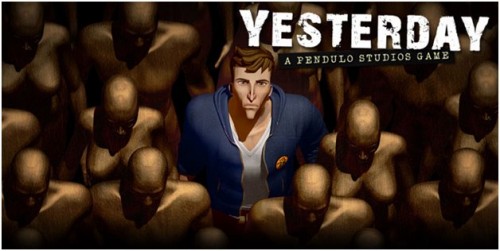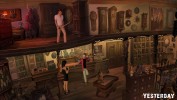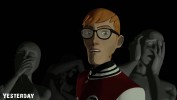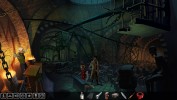Yesterday, from The Next Big Thing makers Pendulo Studios, aims to make what’s old in adventure games (dark plots of conspiratorial cults) and games in general (amnesiac protagonist) new again. With a cartoonish art style belying its twisted nature, does this globe trekking adventure of alchemy, Satanism, and romance manage to uphold Pendulo’s recent reputation? Or is Yesterday doomed to fester in the past?
The prologue chapter of Yesterday puts you briefly in control over Henry White, a wealthy business heir and activist for the homeless, and his bumbling jock bestie Samuel Cooper. Their gleeful Hardy Boys demeanor attempts a turn towards the dark and twisted before the plot thrusts forward a few decades and shifts perspective to the amnesiac John Yesterday, a cult researcher under the employ of Henry White, now a corporate millionaire. The rest of the game is spent the expected narrative haze of retroactive remembrance with Mr. Yesterday, digging up memories and extended flashback sequences while discovering malevolent ties between the ensemble cast and the ancient Satanist practices of the Order of the Flesh.
The puzzles you’ll encounter on your way to dark enlightenment are uniformly well executed. Managing to straddle the uncomfortable gap between insultingly easy and moon logic, the vast majority of your points and clicks falling into place with a satisfying fluidity. Most of this smooth feel is directly due to the solid HUD design, a retractable single bar menu containing all options and inventory at the bottom of the screen. There the player can highlight all interactive objects on each screen (avoiding the deadly genre pitfall of pixel hunting) or nab a quick hint or three. Some tips come off as more rude than helpful, but the system benefits from a recharge meter that refills only after the player attempts solutions without direction. There was only a singular logic gap that had us random clicking everything on everything else to help charge up for another hint, but it was the lone exception to the game’s above average difficulty balance. More menu options beyond volume control would have been appreciated, but with characters simply fading in and out between objects of interest rather than constantly traversing the breadth of each screen, things like movement speed are hardly on the mind.
Things on the narrative end are far less attractive, not just because of the constant themes of torture. The opening mission establishes an amiably cornball duo of geek and jock, both playable and with different approaches to similar puzzles that reflect and strengthen individual personalities. And while the build towards tension falls flat on its face, a decently unforeseen twist is managed within the last moments of the chapter, subtlety built up and reinforced in hindsight. The game then abruptly cuts to decades into the future and shoves our stiltedly voiced protagonist into focus, abandoning one of the only plot threads of any interest to a hasty exposition dump in the game’s final moments. The intriguing multi-character puzzle solving also goes through the window, leaving a disappointingly traditional – if streamlined – adventure experience.
This failure to endear is only more evident due to the main plotline’s staggering pace and erroneous sub-chapters. How a five hour game managed to have this much filler is a marvel in poor narrative execution. While it’s themes of ritualistic torture and alchemy constantly aspire to tickle the darker corners of the player’s mind, Yesterday suffers from a crippling tonal confusion immediately after the introductory cinematic. A combination of an anachronistically cartoonish art style and an unwillingness to forgo a sense of humor that’s stunted at best cripples the sense of morbid weight the game labors for. Exaggerated lip flaps and soft blues do not a scary atmosphere make. Shading, particularly on character faces, manages to be the lone aspect of the art direction working in the game’s favor. Descriptive text also manages a demented sense of place, which still unfortunately contrasts with what we actually see. The various scenic locales across the globe Yesterday visits, while expertly rendered and varied, boast too cheerful a color palette and lighting design to drum up any sense of tension. Combine that with the goofily exaggerated character models, and Yesterday traps itself within a temperamental imbalance it constantly fails to escape. There is such a thing as purposeful atonality, even in horror titles, but whatever expertise that allows for such conflicting directions to benefit a production is not evident here.
Aside from a gleeful couple of comic relief characters at a French antique shop, the sole glimmer of interest in Yesterday’s story is its play on the character portrait method of dialogue exchange. An old habit of adventure games, these dueling comic book squares manage to pull off some serious moments of intimacy, and even travel through time with an immediacy and effectiveness that belies their stark simplicity. The motif fits well with Yesterday‘s affection for sequential art, everything from floating text boxes and paneled fight scenes contribute to a cohesive – if largely incongruous to the rest of the game’s style – presentation. It is not, however, enough to save a script full of meandering sub-stories and a horribly mishandled macguffin. The game’s multiple endings are all decided in the last minute of gameplay, with a hidden ending providing a bit more satisfaction.
A solid puzzle foundation and difficulty curve do nowhere near enough to make up for Yesterday‘s miserably handled narrative. An inharmonious design trips over any sense of tension or atmosphere, and through it all we are saddled with a protagonist who sounds as bored with the whole thing as we ultimately are. Had the art, lighting, and modelling design tended toward a more thematically appropriate style, the plot may not have suffered from a confused tone so dramatically. For $30, you’re getting approximately 30 screens to explore and less than half that in interactive NPCs. Struggling to remain relevant to itself at a mere five hours, what’s here barely feels finished at all. Unless you’re a game writer as amnesiac as John Yesterday and in desperate need of a failure to learn from, leave this one to the past.
Name: Yesterday
Available On: PC
Price: $29.99
Developed by: Pendulo Studios
Published by: Focus Home Interactive
Release Date: March 22nd, 2012
Elder Geek Score: 2 out of 5/Don’t Bother






Wow, that’s harsh. I liked the unusual name (for a videogame at least) enough to be interested, but seems like I’ll be passing.
I still want to see a bit more of Yesterday. Hearing that it is really short doesn’t help when it has a $30 price tag, but I like bits of the style.